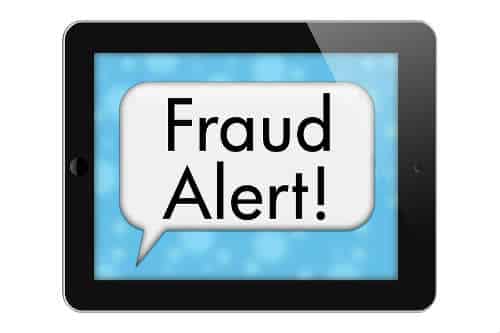Fraud alerts help you thwart identity theft by preventing a crook from opening credit in your name. There are two types of Fraud Alerts: an Initial Alert and an Extended Alert.
With an initial alert, an ID theft warning statement is placed on the bottom of your credit reports. This statement alerts your creditors that you may have been the victim of fraud or identity theft.
Additionally, your phone number is listed on your credit file, so that if anyone pulls your credit, a lender or creditor is supposed to call you first to verify that it’s really you. This process helps stop the identity thieves dead in their tracks. Here are the phone numbers you can call 24 hours a day to set up a fraud alert:
Equifax 800-525-6285
Experian 888-397-3742
TransUnion 800-680-7289
What You Must Know About Fraud Alerts
You only need to call one of the credit reporting agencies to request a fraud alert. Once you put a fraud alert on your credit file at any one of the three credit bureaus, all of them are notified about it.
An initial fraud alert is good for a 90-day period. It’s best used if you suspect someone may have tried some funny business with regard to unauthorized use of your credit or social security number. Once you put an initial fraud alert on your credit file, you are entitled to get a free copy of your report.
Upon receipt of your files, review them immediately to search for anything that looks amiss. If there is no fraud that is apparent, you can either ask that the alert be dropped or simply allow it to expire in 90 days. If you do detect evidence of identity theft, your next step should be to request an extended alert.
When to Get An Extended Fraud Alert
An extended fraud alert lasts for up to 7 years, and is sometimes referred to as a “victim statement.” An extended alert should definitely be added to your credit files if you have been victimized by identity theft, because you’ll want to monitor your credit files closely and safeguard further use of your credit for a long time to come.
That extended alert statement will also put potential credit grantors on notice about your situation, requiring them to call you before granting any credit in your name.
What You Need to Have When Contacting the Credit Bureaus
Equifax, Experian and TransUnion all allow you to place fraud alerts on your credit files free of charge. Separately, if you want to submit a credit alert to Innovis, contact that bureau at 800-540-2505 Monday through Friday between the hours of 8:00 am and 8:00 pm Eastern Time.
Innovis does not share its fraud alerts with the other credit bureaus. If you write to the bureaus to place an extended fraud alert, send them a copy of a valid police report, and proof of your identity and address. Proof of your identity can be a copy of your social security card, a W-2 form, or a pay stub with your social security number on it.
To confirm your address, send a copy of your driver’s license, or a recent utility bill or credit card statement showing your name on it and where you live.










